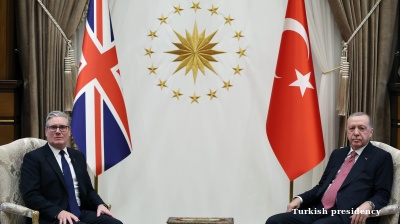Strong base effects meant Turkey’s official consumer price index (CPI) inflation fell sharply to 9.26% in September after slowing to 15.01% in August. The Turkish Statistical Institute (TUIK) confirmed the much anticipated big decrease, which took the rate into the single-digit figures for the first time in two years, in an October 3 announcement. It led to immediate and widespread predictions that the central bank will follow through with more rate cuts.

President Recep Tayyip Erdogan has been pushing hard for continued and substantial monetary easing as his administration attempts to open the credit taps to ramp up economic growth in Turkey, the economy of which was humbled by a bitter recession earlier this year which came in the wake of the 2018 summer currency crisis that sent inflation soaring to a 15-year high above 25% in October last year. Plenty of analysts believe it is unquestionably strongman Erdogan who is at the helm when it comes to the country’s monetary policy, not the central bank.
“The gap between the policy rate at 16.5% currently and a single-digit inflation rate will most probably attract the president’s attention,” Inan Demir, an economist at Nomura International in London, told Bloomberg after the latest inflation data was announced.
“These figures mean that President Erdogan is likely to keep up the pressure on the central bank for further large interest rate cuts,” Jason Tuvey of Capital Economics said, re-emphasising the point.
Currency effect
Bloomberg economist Ziad Daoud noted that the steep decline in inflation—slightly steeper than foreseen by economists, with a pre-announcement Reuters poll producing a forecast of 9.6%—was the result of strong base effects linked to the lira, which lost around a third of its value against the dollar last year and has lost around another 8% to date this year. “The currency effect will slow price growth further in October before turning inflationary later this year, limiting the central bank’s room to ease policy,” he said.
Inflation is widely expected to rebound by the end of this year to around 12-13%. However, that still leaves plenty of space for the central bank to ease policy a bit more. Three weeks ago, the regulator adopted a second consecutive sizeable rate reduction. Since late July, it has slashed the key rate by 750 bp to the present 16.50%.
Also eyecatching was a big change in producer price index (PPI) inflation, which for September came in at 2.45%, after a 0.13% m/m rise, from 13.45% in August. PPI reached a peak 13 months ago of 46.15%.
Month-on-month, September’s CPI inflation was recorded at 0.99%, less than the Reuters poll forecast of 1.30%.
In its latest medium-term economic plan, the government forecasts annual inflation at 8.5% by the end of next year. It also sees a GDP expansion of 5% in 2020, up from expected growth of 0.5% this year.
Sounding the alarm
But analysts, as well as the International Monetary Fund (IMF), have sounded the alarm over driving hard for such a sharp economic turnaround, with anxieties spreading that the central bank could adopt easing that is far too quick. The calm on Turkey’s financial markets “appears fragile” the IMF said on September 23, cautioning that the expansion in lending being pushed by officials should only be targeted at “viable borrowers” and determining that the central bank’s chopping of its key rate by 750 bp was “too aggressive”.
“Any further easing would likely put pressure on the [lira], unless the pace of easing is in line with or slower than the rate of decline in inflation, or G3 central banks start to surprise in a dovish direction again,” Goldman Sachs analysts wrote in a note to investors.
Economists also remain unsettled by Turkey’s all-time-high dollarisation. Foreign exchange held by Turks climbed to a record peak of $193.69bn as of September 27, according to central bank data released on October 3.
Turkish Finance Minister Berat Albayrak said after the release of the data that the government was planning to introduce new measures to boost the lira. “We will see steps in the coming period that will have a strong positive impact on the lira in terms of dollarisation,” Albayrak said, adding: “With the steps we will take in the coming period, the improvement in dollarisation will continue.”
Just short of midnight on October 2, the lira was 0.14% stronger against the dollar at 5.6925.
News

Serbia’s NIS posts 9-month net loss as US sanctions weigh on performance
NIS, majority-owned by Russia’s Gazprom Group, said it had operated in “extremely complex circumstances” after sanctions were announced by the US Treasury Department.

Nigeria's Heirs Energies' CFO on powering growth via sustainable, indigenous-led development
NewsBase speaks exclusively to Samuel O. Nwanze, Executive Director and Chief Financial Officer of Nigerian indigenous integrated oil and gas company Heirs Energies.

Brazil's Lula "horrified" as Rio police raid death toll reaches at least 130
Brazilian President Luiz Inácio Lula da Silva expressed shock at the fatalities from a massive police operation targeting Rio drug gangs that left scores dead, while residents and rights advocates accused authorities of summary executions.

Nigeria's NNPCL weighs technical equity partnerships to revive idle state-owned refineries
NNPCL is reviewing options to bring the Port Harcourt, Warri and Kaduna refineries back into meaningful operation, possibly by bringing in technical equity partners to upgrade or repurpose units.


_Cropped_1761809941.jpg)

